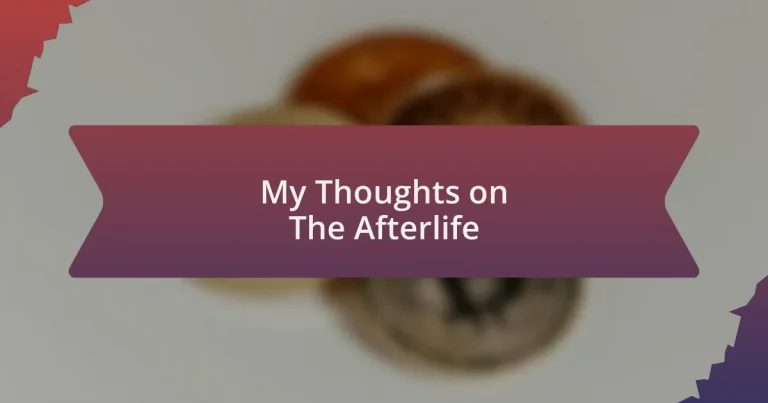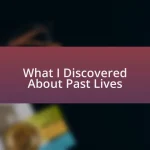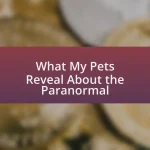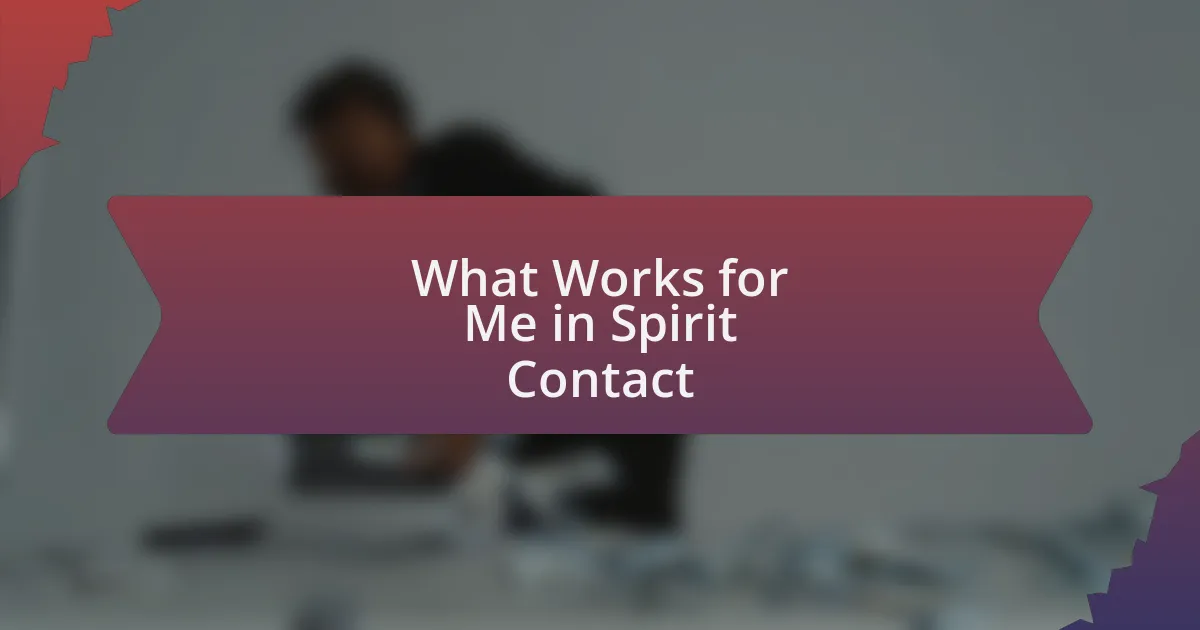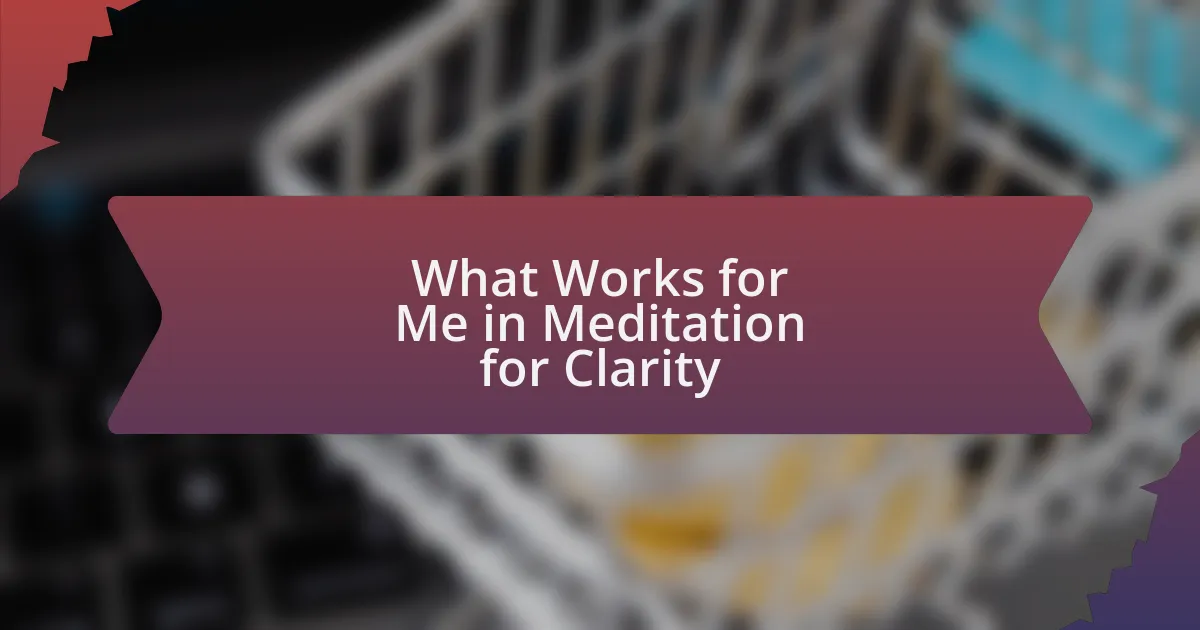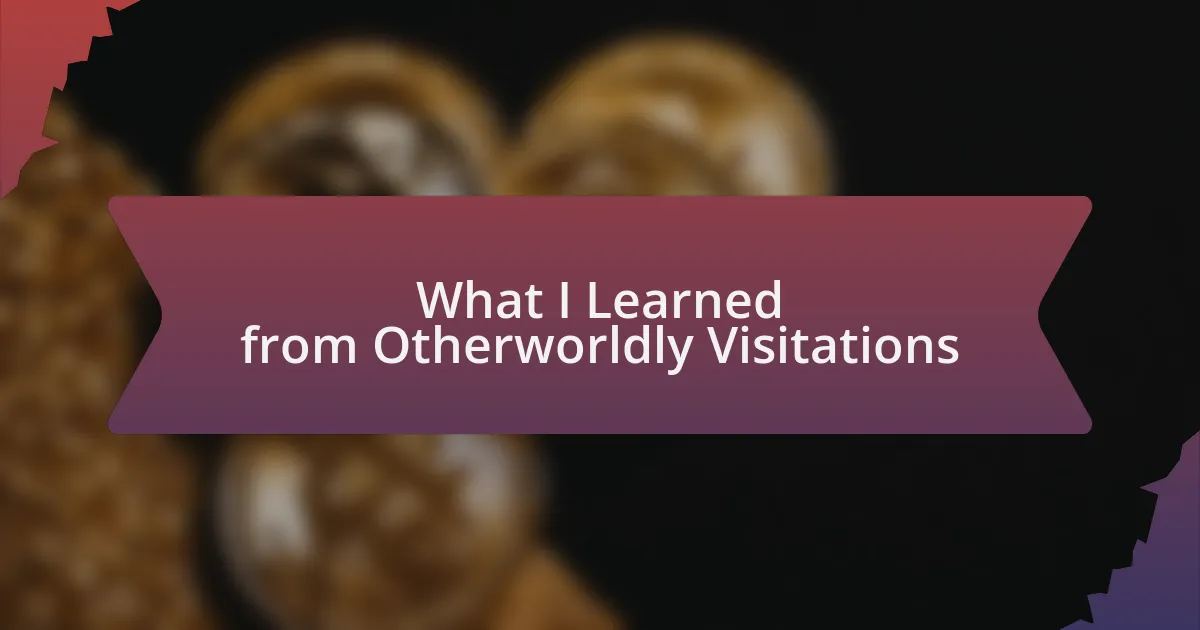Key takeaways:
- The concept of the afterlife varies across cultures, often driving moral reflections and influencing how individuals choose to live.
- Personal experiences, such as near-death experiences and ghost encounters, spark curiosity and provoke discussions about the nature of existence.
- Engaging audiences by sharing personal stories or encouraging them to share their beliefs fosters a community focused on understanding mortality and the afterlife.
- Phenomena like electronic voice phenomena (EVP) and near-death experiences provide intriguing insights into the possibility of consciousness existing beyond physical death.
Author: Evelyn Hartman
Bio: Evelyn Hartman is a contemporary author known for her evocative storytelling and rich character development. With a background in psychology, she weaves intricate narratives that explore the complexities of human relationships and personal growth. Her debut novel, “Whispers in the Wind,” garnered critical acclaim and established her as a powerful voice in modern literature. Evelyn resides in the Pacific Northwest, where she draws inspiration from the vibrant landscapes and diverse communities around her. When she’s not writing, she enjoys hiking, gardening, and spending time with her two rescue dogs.
Understanding the afterlife concept
The afterlife concept is a deeply ingrained aspect of various cultures and religions, each offering unique interpretations. Personally, I often find myself wondering why this idea resonates so powerfully with humanity. Is it our innate desire for continuity or a fear of the unknown that drives our fascination with what lies beyond?
In my experience, stories of near-death experiences frequently highlight common sensations, like a feeling of peace or encounters with loved ones. I recall one friend sharing how, during a severe illness, they felt a comforting presence that seemed to say everything would be alright. Such accounts provoke questions: Are these merely hallucinations, or do they hint at something more?
As I delve deeper into the afterlife’s many representations, I’ve come to appreciate its role in shaping our moral frameworks and life choices. It seems that contemplating the afterlife inspires us to live more meaningfully. What kind of legacy do we want to leave behind, and how does our understanding of the afterlife influence that vision?
Overview of paranormal beliefs
Beliefs surrounding the paranormal often stem from humanity’s quest for understanding what exists beyond our physical realm. Many cultures embrace the idea of spirits, ghosts, and energies that linger after death. It makes me think about the stories I’ve heard from people who claim to have had ghostly encounters; isn’t it intriguing how these experiences can’t easily be brushed off as mere figments of imagination?
In my exploration of paranormal beliefs, I’ve come across fascinating rituals and practices intended to communicate with the deceased, like séances or mediumship. I once attended a local séance out of curiosity, and I was struck by the genuine emotions of participants hoping to reconnect with lost loved ones. Their heartfelt desire to seek closure really highlights the lengths to which people will go in pursuit of answers about what lies beyond.
Ultimately, these beliefs touch on a universal human experience—the struggle to make sense of mortality and the hope that our essence continues in some form. It raises an essential question: Are these beliefs simply coping mechanisms, or do they offer genuine insights into our existence? Reflecting on this personally, I can’t help but wonder if our beliefs shape our experiences of life and death more than we realize.
Podcasting the afterlife experience
Podcasting the experience of the afterlife is an intriguing way to open the conversation about what lies beyond. I remember listening to a podcast where a host interviewed a psychic who described chilling encounters with spirits attempting to communicate their messages. It struck me how the mix of real-life stories and expert insights can really challenge our perceptions and provoke curiosity about the afterlife.
The format of podcasting allows for an intimate exploration of these profound topics. For instance, I once heard a survivor of a near-death experience share their journey in such vivid detail that it left me pondering the possibilities of what lies beyond. Isn’t it fascinating how these personal narratives can shift our understanding of life and death?
With each episode, listeners can engage with varying perspectives on the afterlife, whether scientific, spiritual, or anecdotal. I’ve found myself enthralled by discussions highlighting real-life ghost encounters, tapping into my own skepticism while remaining open to the stories being told. How do these narratives not only shape our beliefs but also connect us to one another in a collective quest for understanding?
My personal afterlife beliefs
When I contemplate the afterlife, my beliefs often sway between hope and uncertainty. I remember a vivid dream I had after losing a close family member; it felt so real that it led me to wonder if our consciousness lingers somehow after we pass. Could it be that our connections transcend physical boundaries, offering us a way to still reach out to those we’ve lost?
One aspect I find compelling is the idea of reincarnation. I encountered a fascinating story about a child who vividly recounted past-life memories. Listening to that narrative stirred something in me; it made me reflect on the possibility that our souls embark on continual journeys—learning and growing through each existence. Isn’t it intriguing to think that we might return with unfinished business or lessons yet to master?
As I delve into my own musings, I often find comfort in the thought that we might not truly vanish but rather transform into a different state of being. I’ve engaged in countless conversations about this topic with friends, debating the varying interpretations of heaven, hell, or simply peace. Through these discussions, I realize that while we may never fully understand what awaits us, the shared search for answers fosters a sense of connection among us all.
Insights from notable guests
Some guests on the podcast have shared experiences that truly challenge our conventional viewpoints. One notable interview featured a woman who claimed to have had a near-death experience during a medical emergency. She described visiting a breathtaking realm filled with light and love, drawing a stark contrast to her life on Earth. Listening to her, I couldn’t help but wonder: could this profound journey be a glimpse into what lies beyond?
Another guest, a respected medium, discussed how he communicates with spirits to convey messages to their loved ones. He recounted heartwarming stories of reconciliation and peace, telling about a woman who received a message from her mother that brought her to tears. It left me pondering the nature of our bonds; do they really persist beyond death, offering a lifeline for those grieving?
Interestingly, a philosopher we invited tackled the concept of the afterlife from a rational perspective. He emphasized that while scientific evidence may be sparse, the sheer volume of anecdotal evidence cannot be ignored. His insights made me reflect: if so many individuals have reported transformative experiences, might there be more to the afterlife than we can currently fathom?
Engaging listeners on the topic
Engaging listeners on the topic is all about creating a personal connection. I remember during a live episode discussion, I shared my own experience of visiting a haunted location. As I recounted my feelings of unease mixed with excitement, I could almost feel the curiosity radiating from our audience, as if they were there with me. Isn’t it fascinating how sharing a personal story can make abstract concepts like the afterlife feel tangible and relatable?
Another engaging approach is inviting listeners to share their own experiences. I once asked our audience to send in their thoughts on what the afterlife means to them, which resulted in a flood of heartfelt stories. Reading those accounts made me realize how diverse our understandings are—each story was unique, but they all resonated with a common search for meaning. Have you ever thought about how sharing your own beliefs could open up a deeper dialogue?
Lastly, exploring the emotional aspects of the afterlife can spark profound conversations. I’ve found that discussing the fear and hope surrounding death often leads to more passionate exchanges. When we tackled the topic of grief in an episode, I noticed how many listeners reached out, sharing their vulnerabilities and fears. Isn’t it powerful how a simple conversation about something as universal as death can create such a meaningful community?
Exploring related paranormal phenomena
Exploring paranormal phenomena often leads us into experiences that border on the inexplicable. For instance, I remember visiting a reputedly haunted hotel, where guests frequently reported seeing shadowy figures. My encounter with such a presence was brief yet left an indelible mark on my perception of reality—isn’t it intriguing how one fleeting moment can shift our understanding of what exists beyond our senses?
One captivating aspect of the afterlife discussion is the phenomenon of near-death experiences (NDEs). I recall reading accounts from people who have had vivid experiences while clinically dead, describing sensations of warmth, light, and peace. These shared narratives often raise questions: could it be that our consciousness persists in some form beyond death? The striking similarities across these stories suggest a deeper connection to the afterlife that we are only beginning to grasp.
Another interesting phenomenon is the rise of electronic voice phenomena (EVP), where voices or sounds are captured on recordings, often answering questions posed by the living. In my own investigations, I was skeptical at first, but hearing a clear response during one session transformed my perspective. It made me wonder—could these voices be messages from those who have crossed over, or simply echoes of energy left behind? This exploration continually feeds my curiosity and challenges my beliefs about what lies beyond our current understanding.
